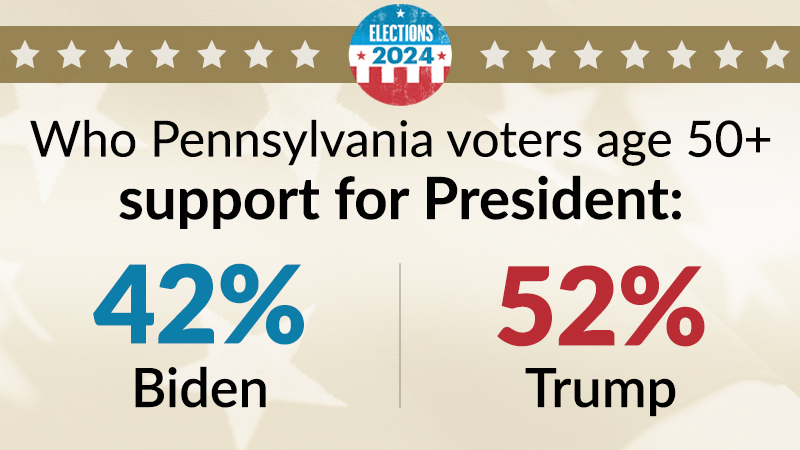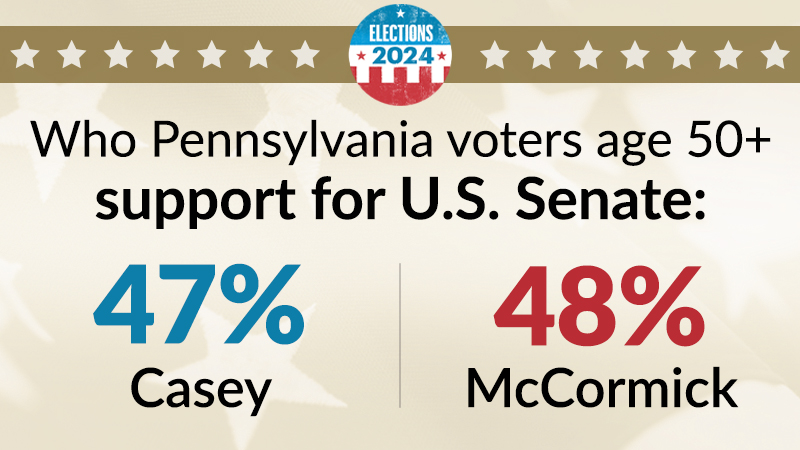AARP Hearing Center
Exclusive AARP Poll: Trump Has Edge Over Biden With Pennsylvania Voters 50+
En español | More voters in the presidential election battleground state of Pennsylvania say they would vote for former President Donald Trump than for President Joe Biden, according to an exclusive new AARP survey.
Fifty-two percent of Pennsylvania voters age 50-plus said they would support Trump, compared with 42 percent for Biden, a 10-point lead. Pollsters in late April asked voters who would get their vote if the election were held today between Biden, a Democrat, and Trump, a Republican.
Trump maintained a 4-percentage-point lead among Pennsylvania voters of all ages, with 49 percent favoring him, compared with 45 percent for Biden, the poll showed. Among state voters age 65-plus, Trump’s lead narrowed, putting him ahead of Biden 48 percent to 46 percent. Among women 50-plus, the gap was even smaller, with Biden ahead by 1 percentage point.

Pennsylvania is among the battleground states for the presidency, giving the winner 19 electoral votes toward the 270 total needed. In 2020, Biden won Pennsylvania, garnering 50 percent of the vote compared with 48.8 percent for Trump.
Voters were also asked about how each candidate performed as president. For Biden, 41 percent of voters 50-plus approve of what he is doing in office, while 58 percent disapprove. For Trump, 55 percent of voters 50-plus approve of what he did as president, versus 43 percent who disapprove.
Pollsters interviewed 1,398 likely Pennsylvania voters about the presidential and U.S. Senate races and about the issues motivating them to vote, according to the AARP–commissioned survey conducted from April 24 to April 30 by the bipartisan polling team of Fabrizio Ward and Impact Research.
Voters were split when it came to Pennsylvania’s U.S. Senate race. Incumbent Democrat Bob Casey Jr. and Republican challenger Dave McCormick were nearly even among voters 50-plus: McCormick led by 1 percentage point. However, the poll showed Casey leading by 4 percentage points among likely voters of all ages, with 48 percent supporting Casey compared with 44 percent for McCormick.

In the race for Pennsylvania attorney general, Republican Dave Sunday had the lead among 50-plus voters, with 49 percent supporting him, compared with 41 percent supporting Democrat Eugene DePasquale, the poll found.
Bob Ward, a partner in Fabrizio Ward, said “all eyes will be on” Pennsylvania from now until Election Day.
“This poll shows that Pennsylvania is intensely competitive, with Trump leading Biden by a small margin, and Democrat Casey leading Republican McCormick by a small margin for Senate,” Ward said.
Overall, interest in voting in November is high. Eighty-five percent of Pennsylvania voters 50-plus said they are “extremely motivated to vote” in the November election for president, U.S. Senate and Congress. Sixty-seven percent of those older voters said they planned to cast a ballot in person on Election Day, while 21 percent said they would vote by absentee or mail-in ballot. Ten percent said they would opt for early in-person voting.

Bill Johnston-Walsh, state director for AARP Pennsylvania, said older voters in the state will play a key role in determining who wins in November, as they have in past years. About 5 million Pennsylvanians are 50 years of age and older, he said.
“This is one strong voting block,” Johnston-Walsh said, “and political candidates of all affiliations need to pay attention to their needs and concerns if they want to win.”
Social Security, Medicare are key concerns
Issues are often the driving force for these voters. Eighty percent of voters age 50-plus said a candidate’s stance on Social Security is “extremely or very important” to them when deciding who to support this November.
After Social Security, age 50-plus voters identified Medicare (73 percent), cost of prescription drugs (67 percent), policies to help seniors live independently at home as they age (69 percent), housing costs (58 percent) and cost of utilities (68 percent) as key issues in their candidate choice.

“It is not surprising that older voters are more likely to vote for candidates who say they will make sure workers get the Social Security they paid into and earned through a lifetime of hard work,” Ward said. “Candidates not talking about the importance of Social Security are making a big mistake.”
In the 50-plus age demographic, 63 percent of voters reported being worried about their finances, compared with 37 percent who aren’t. Older voters said their biggest cost concerns centered on paying for utilities like electricity, heat and water; food; and health care and prescription drugs.
When asked about the country’s trajectory, only 29 percent of voters in the 50-plus age category said it is headed in the “right direction,” while 68 percent said the country is heading in the “wrong direction.”
Older Pennsylvanians are also concerned about the costs of caregiving for an older or ill adult or someone with a disability, said Johnston-Walsh. Twenty-seven percent of voters 50-plus said they considered themselves to be a family caregiver, the poll found.
Caregivers “are balancing work with caregiving and often exhausting their own savings to care for a loved one,” Johnston-Walsh said.
Matt Hogan, a partner with Impact Research, noted that voters 50-plus want candidates to focus on the issues they care about. “More than three-quarters of voters 50-plus are willing to reward candidates who will provide support for family caregivers who are helping their loved ones live independently in their homes,” Hogan said.
Michelle Tuccitto Sullo is a contributing writer covering state and federal policy. She previously served as managing editor of the Hartford Business Journal in Connecticut and has worked for the New Haven Register, Connecticut Law Tribune and New Haven Biz.

































































